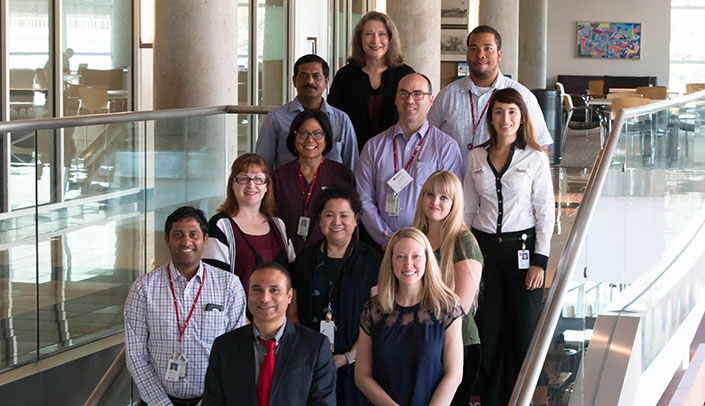UNMC, in collaboration with the VA Medical Center, has enrolled 219 people for an interventional drug trial designed to explore drug treatment efficacies in type 2 diabetes.
Out of 40 sites across the nation, the UNMC/VA Medical Center enrollment total is the second highest in the country for the GRADE (Glycemia Reduction Approaches in Diabetes: A Comparative Effectiveness) Study.
Only a location in Washington, D.C., enrolled more people, and this location has a much larger population and patient base.
The success, according to site principal investigator Cyrus Desouza, M.B.B.S., was due to a motivated recruitment team and a series of recruiting innovations — starting in the second half of 2012 — that enabled UNMC to exceed its initial recruiting goal of 150 participants.
Approximately 150 sites applied to be part of the study, said Dr. Desouza, chief of diabetes, endocrinology and metabolism. The key to UNMC’s selection was its recruitment plan.
“We were always reviewing the recruitment, every week,” he said. “Every month, we would have a strategy session.”
The recruitment team partnered with OneWorld Community Health Center, as well as reaching out to community health centers in South and North Omaha, as well as the Charles Drew Clinic.
The team also worked with electronic health record specialists to produce a patient list of possible subjects. This was the single most effective recruitment tool.
The team attended community health fairs, used radio advertising, even used an email blast strategy to targeted type 2 diabetes patients from a purchased database.
The results were mixed in some cases.
“The radio ads didn’t work too well,” Dr. Desouza said.
The email blast produced a lot of responses from late-in-the-disease patients, but the study was seeking people in the early stages.
But, on the whole, efforts were a success, and in the process, the team pioneered new recruitment strategies for UNMC.
“The two initiatives we pioneered that will make it easier for any future studies were the ability to search the whole database for compatible patients and the creation of the opt-in clause.”
Every patient who comes into Nebraska Medicine is now asked, “If there is a research study in the future, would you like to be contacted?”
During the recruitment process, the department worked closely with the Institutional Review Board throughout the development and implementation of these novel recruitment methods.
“GRADE was a large study; it needed a large recruitment,” Dr. Desouza said. “We needed to think outside of the box.”
